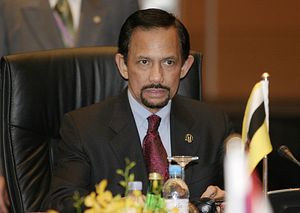With the price of oil at record lows, the small Southeast Asian nation of Brunei is quickly becoming the first oil-rich country to fall victim to an economic reliance on the energy industry. The hydrocarbon-dependent sultanate of 420,000 people now stands on the precipice of an economic calamity. At the apex of its 2008-2015 financial crisis, Greece’s budget deficit was equal to 15.7 percent of its GDP. For the 2015-2016 fiscal year, Brunei is currently on track to report a fiscal deficit valued at 16 percent of its GDP. With economic stagnation inevitable, the likelihood that the country will remain one of Asia’s richest states grows increasingly slim.
This fall from the top is all the more astonishing given the country’s current affluence. By GDP (PPP) per capita, Brunei ranks as the 4th wealthiest country in the world, according to the IMF. Due to many years of soaring demand for its vast energy resources, this small sovereign state the size of Delaware has known no end to its oil-fueled largesse, having no income tax or sales tax for locals, offering free education through university, and subsidizing housing.
But the good times are long gone: The global price for a barrel of oil has plummeted 40 percent since January 2015 and 78 percent since its peak value in 2008. Since more than 95 percent of Brunei’s exports are oil- and gas-related, for the past three years in a row Brunei’s GDP has contracted.
This has resulted in acute strain on the country’s finances. Income from hydrocarbons comprises 90 percent of government revenue – as such government earnings have already dropped about 70 percent compared to the 2012/2013 fiscal year. Despite having already trimmed the $6.4 billion 2015/2016 budget by roughly 4 percent compared to last year, further spending cuts are widely expected.
Brunei’s generous social contract greased by oil money is unlikely to last much longer in the face of yawning deficits. Such reductions are likely to anger the public, accustomed as they are to decades of benefits stemming from free-flowing oil revenue. The Sultan, a lavish spender with an estimated net worth of $27 billion, may soon find himself in the uncomfortable position of explaining the need for economic austerity to his citizens. Any resulting instability would only further hinder the country’s ability to attract foreign investment.
While Brunei has announced a development plan – Vision Brunei 2035 – to build other parts of its economy. Thus far there is little to show for it. Rather than focus on efforts to build sectors outside of the oil and gas industry, Brunei has chosen to pump even more oil.
The Sultan recently pointed to several big-ticket infrastructure projects in his New Year’s Eve address, but such construction efforts do little to abate foreign concerns over obstacles to operating within Brunei. The World Bank ranks Brunei 84th in terms of ease of doing business, well below the regional (Asia & Pacific) average of 61. And with an estimated 70-80 percent of the country’s citizens employed by the government or government-linked institutions, according to FT Confidential Research, there is limited hope for an internally-driven economic expansion.
Attempts to double down on Islamic finance have been stymied by neighboring Malaysia, a robust hub of Islamic banking itself, and Indonesia, which is rapidly building up its own financial industry. As for any optimism about developing tourism, the recent imposition of Sharia law might give holidaymakers pause about visiting a country that has banned both alcohol and Christmas.
Moreover, the currency remains pegged one-to-one with the Singaporean dollar, causing Brunei to be one of the region’s most expensive places to live and work – even in the face of its sluggish economy. Maintaining such a costly exchange rate will only further exacerbate development difficulties given the country’s current economic headwinds.
The flight of foreign labor and capital should not be the only concern of policymakers; faced with dismal economic prospects at home, Brunei’s own skilled laborers may consider opportunities in places that are free of moralist government intervention. Unless Brunei can quickly find a way to outperform its “middle-income” neighbors such as Malaysia and Thailand and reassure its own people of its place in Southeast Asia’s firmament, it will find itself in dire straits. Perhaps the recently signed Trans-Pacific Partnership will help provide economic salvation, but as the smallest economy of the twelve nations in talks, the negotiated outcomes are unlikely to be in Brunei’s favor.
The clock is ticking for Brunei to achieve its planned goal of a “dynamic, sustainable economy” by 2035. According to the BP World Energy Outlook, Brunei’s oil reserves are projected to run out in 22 years. The repercussions will be felt far sooner.
Matthew Prusak lives in Southeast Asia, where he consults for various companies and nonprofit organizations.

































